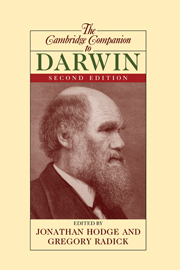Book contents
- Frontmatter
- Introduction
- Part I Darwin’s theorising
- 1 The making of a philosophical naturalist
- 2 The notebook programmes and projects of Darwin’s London years
- 3 Darwin on generation, pangenesis and sexual selection
- 4 Darwin on mind, morals and emotions
- 5 The arguments in the Origin of Species
- Part II Historical contexts
- Part III Current issues
- Part IV Philosphical prospects
- Guide to further reading
- List of references
- Index
5 - The arguments in the Origin of Species
from Part I - Darwin’s theorising
Published online by Cambridge University Press: 28 May 2009
- Frontmatter
- Introduction
- Part I Darwin’s theorising
- 1 The making of a philosophical naturalist
- 2 The notebook programmes and projects of Darwin’s London years
- 3 Darwin on generation, pangenesis and sexual selection
- 4 Darwin on mind, morals and emotions
- 5 The arguments in the Origin of Species
- Part II Historical contexts
- Part III Current issues
- Part IV Philosphical prospects
- Guide to further reading
- List of references
- Index
Summary
Reading On the Origin of Species is a rite of passage for many biologists and its reasoning continues to play a pivotal role in biological thought. It is often said, following Darwin himself, that the Origin is 'one long argument' (459). There is something important in this remark. Readers expecting the Origin to be structured around a narrative account find the book perplexing. Unlike the paradigmatic early Victorian book on evolution, the Edinburgh journalist Robert Chambers' Vestiges of the Natural History of Creation, published anonymously in 1844, the Origin was not written as a history of life's evolution on earth. Rather, the Origin was structured as an argument. Hence, Darwin's insistence that his book was one long argument provides an indispensable clue for reading the text. But it is not clear that it should be read as one argument. Although Darwin may have designed his book to be read as one long argument for evolution by means of natural selection, many of his readers must have read it differently. We know this because the Origin persuaded many readers to accept the 'evolution' idea but not the 'by means of natural selection' part of Darwin's view. These readers were not swayed by one long argument for evolution by means of natural selection. So, to understand the reasoning that influenced Darwin's readers, it is better to think of the Origin as a body of argumentation flexible enough to allow readers' views of the reasoning to differ from what Darwin might have intended. The aim of this chapter is to provide a guide to the Origin's flexible and sometimes elusive body of reasoning.
- Type
- Chapter
- Information
- The Cambridge Companion to Darwin , pp. 120 - 144Publisher: Cambridge University PressPrint publication year: 2009
- 14
- Cited by



